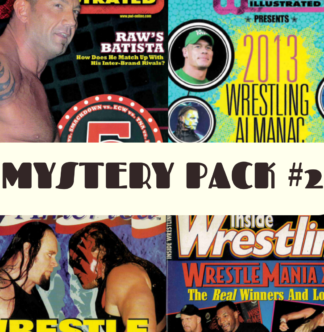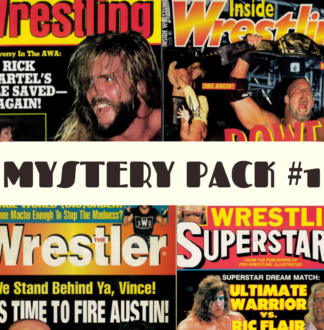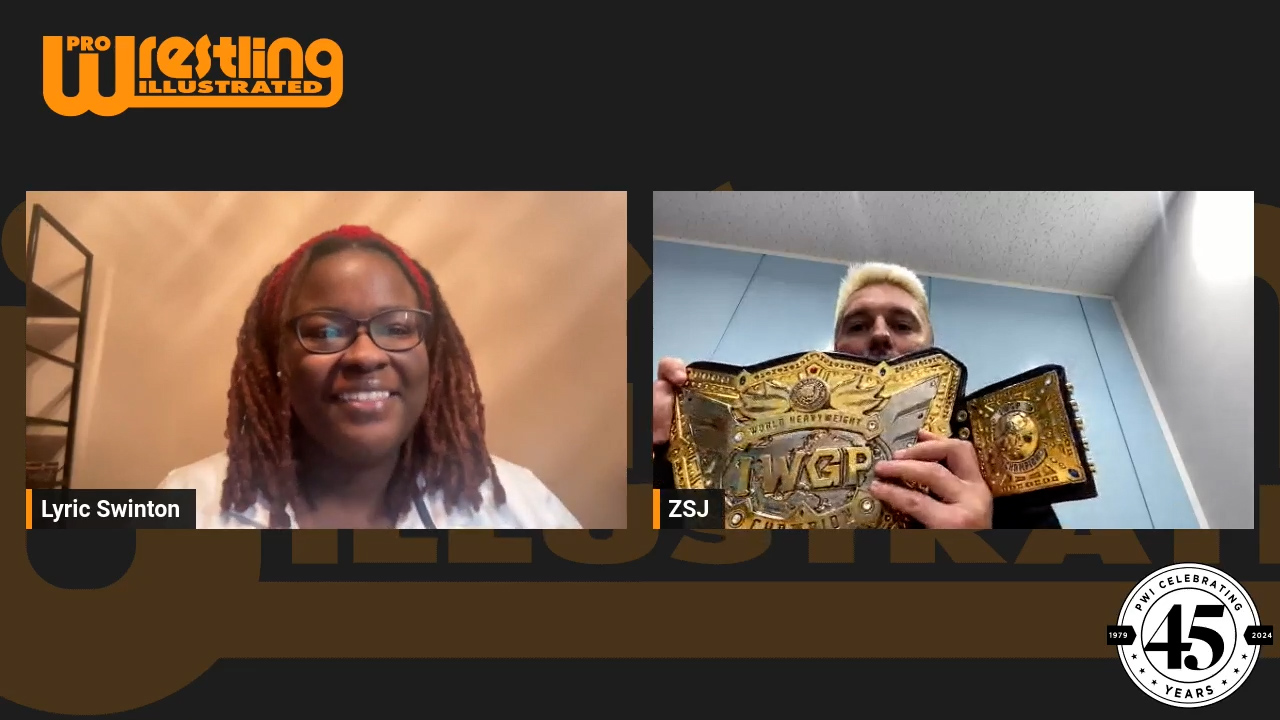
IWGP World Heavyweight Champ Zack Sabre Jr. Talks The Future Of NJPW, TMDK, Nigel McGuinness, Technical Wrestling, and Wrestle Kingdom/Dynasty
FEW WRESTLERS HAVE A stronger case for calling 2024 their year than Zack Sabre Jr. His growing list of accomplishments includes becoming the second foreigner to win the G1 Climax, big wins over Bryan Danielson and Hechicero, wrestling in Wembley Stadium, winning the IWGP World heavyweight championship, and walking into the main event of Wrestle Kingdom in the Tokyo Dome as the champion. To add a cherry on top, the TMDK frontman was voted as 2024’s Tokyo Sports MVP, becoming only the second foreigner to claim that distinction.
Zack Sabre Jr. has long been lauded as the best technical wrestler on the planet. But as he heads into potentially two back-to-back Tokyo Dome main events versus Shota Umino and Ricochet respectively, Sabre has earned the right to be referred to as simply the best. PWI contributor Lyric Swinton caught up with the world champion shortly after the conclusion of World Tag League for an exclusive interview about the future of NJPW, TMDK, Nigel McGuinness, technical wrestling, and Wrestle Kingdom/Dynasty.
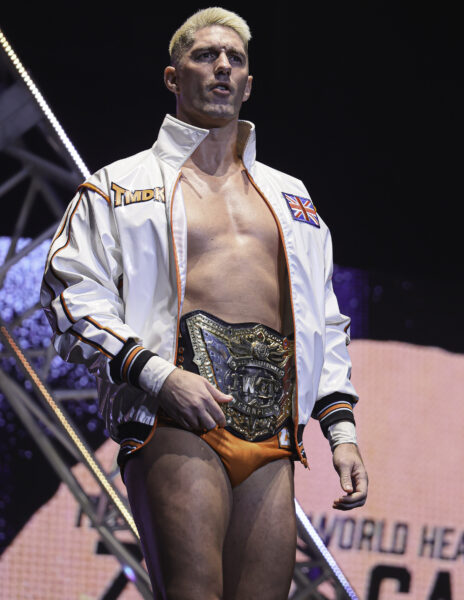
PWI: You’re only the second foreigner to win the Tokyo Sports MVP award. There was a lot of support for you winning the award. You’re in good company with Sareee over on the women’s side. You set a lot of great goals for yourself earlier this year, saying you wanted to be G1 Climax winner, you wanted to be IWGP World heavyweight champion, and you wanted to walk into the Tokyo Dome as champion. Talk about how this award and being the second foreigner to win it fits into some of the goals that you set for yourself at the beginning of this year.
ZSJ: Yeah, I mean, out of all of them, I definitely thought [Tokyo Sports] MVP would be either the most difficult or the least attainable, just because it’s independent from New Japan. I can sort of control my own personal achievements, but [Tokyo Sports MVP] is more objective. I was conscious that only one foreign wrestler had won it before. And essentially, Bob Sapp won it for all of his achievements, but I think it was mostly through his MMA success that year. So yeah, definitely to win it, to have the support of the media … and the committee is quite broad with peers, journalists, and I think especially for them, I’ve been in Japan for 13 years now, so for them to give me that acknowledgment is definitely one of the best things I’ve ever achieved. And it’s the first time I’ve got to reflect on the year. I guess this is where the calendar year’s ending. But with the G1, obviously the focus is just on the size of the match, then after that winning the [IWGP World heavyweight] belt, then trying to get some defenses in before heading into the Dome. So yeah, it’s definitely a real end to the year.
PWI: You talked about winning the G1 and winning the [IWGP World heavyweight] belt and having all this. But you’ve also been a leader in New Japan with TMDK this year and bringing Ryohei Oiwa under your wing, in addition to already having Kosei Fujita. What has that been like, being a leader in New Japan, not just as champion, but also in helping to mold the next generation of stars?
ZSJ: Mikey and Shane dubbed me “The Front Man,” so I guess it’s still technically their group. So yeah, I’ll take the front man on the front of the band. But yeah, my goal … TMDK obviously started as a platform to really spotlight Australian wrestling at a time when there was really no focus on the domestic Australian scene. And Mike and Shane were sort of flying the flag for Australian wrestling. I think if we’d all stayed in NOAH for longer, it was inevitable that I would’ve joined TMDK officially. In the nature of being the only three full-time foreigners there, I was sort of adjacent to TMDK. But then after Suzuki-gun ended, and I joined TMDK, I definitely didn’t want TMDK to be a stereotypical foreign group. That wasn’t going to be part of our mindset for the three of us, especially since Japan’s had such a huge impact on our careers, and I think it would be facetious to hide our love for Japan.
So I was conscious from joining TMDK straight away that I wanted Japanese wrestlers in the group, just to have that connection fully with Japan, and then also to be able to give a different environment for young Japanese wrestlers. Obviously, we’ve been through the dojo system. Even in my original wrestling school [Hammerlock], there was a hierarchy, and there’s a hierarchy system in Japan. But I think that’s important in all of wrestling. I wanted to have an environment in TMDK where it could be more relaxed socially, but then there’s still expectations with training and delivering. It works wonderfully with Fujita. He was already an enigma anyway, but I think his growth from joining TMDK last year to now is pretty unparalleled. And then, likewise, obviously the goal is to do that with Oiwa now. It’s just nice to be able to be in a position to assist young Japanese wrestlers whilst also not stepping on the toes of the environment.
I wasn’t going to treat those boys like I’m a Japanese senpai. That’s not my role. That’s not how I can help them. I think it’s a nice environment for them to be in. And it’s also inspiring for us, as well. They caught my attention. Their debut match, I think, is one of the best debut matches I’ve ever seen. It was in the peak of COVID. The restrictions for the events were very rigid. So to debut in that environment and have that much energy and natural skill was just as inspiring for me.
PWI: Something that most of you in TMDK have in common is your time in Pro Wrestling NOAH. A big thing that happened right before you ended up winning the G1 Climax is that Yoshinari Ogawa announced his retirement. Obviously, he was a big mentor to you throughout your career and also ended up crossing paths with Oiwa right before he came back into New Japan. Talk about the impact that he has had on your career and your being able to achieve so much this year as he’s said goodbye to his own career.
ZSJ: Yeah, by far. I mean, if he’s not the most influential, important figure that I’ve met in wrestling, he’s definitely top two. I grew up watching Japanese wrestling and being a huge Japanese wrestling fan, so I already had an image of Ogawa-san before I got here. And I admired in the peak of All Japan that he just had such a unique presence and clearly his own philosophy. But then also [for me] to come to Japan, especially with the foreign wrestlers, he was so conscious to take care and look out for everyone. He really went above and beyond. The two or so years as his tag team partner is one of the best experiences, not of my career, but of my life, just getting to spend so much time with him professionally and socially and just to talk to him and get his philosophy … not just on wrestling, but on life.
And I mean, you could see until the day he retired, how much passion he had for pro wrestling. He was doing 30-minute draws up until the moment he had to retire. His love for pro wrestling I think was just so apparent. And then, like I said, with Fujita and Oiwa, I had my eyes on them from their debut. Obviously, I dressed them up in my ring gear a couple of times. I definitely was eager to be involved with them. But after Oiwa went over to NOAH for his excursion, it just became a no-brainer that he’d come into TMDK when he [returned to New Japan]. I was speaking to Ogawa regularly, and he was training with Oiwa and speaking very highly of him. Any praise from Ogawa is hard to come by and you have to work for it, so the fact that he was speaking well of Oiwa was all the endorsement that I needed. I think it’s also a nice way for me, Mike, and Shane to be able to be thankful and acknowledge the opportunity that NOAH gave to us and how thankful we are for it. I feel like we sort of get to combine every element of our journeys with TMDK and having Oiwa in there now.
I’m glad that I got to wrestle with Ogawa one last time. I was on the (2023) NOAH New Year show, so obviously I didn’t realize that’d be the last time that I got to wrestle with him. But I’m glad I got to go back twice to NOAH and team up. He’s just the coolest. He’s just the coolest man. He’s the coolest man that ever … he hasn’t aged. He hasn’t aged in two decades or maybe even more. Effortlessly cool.
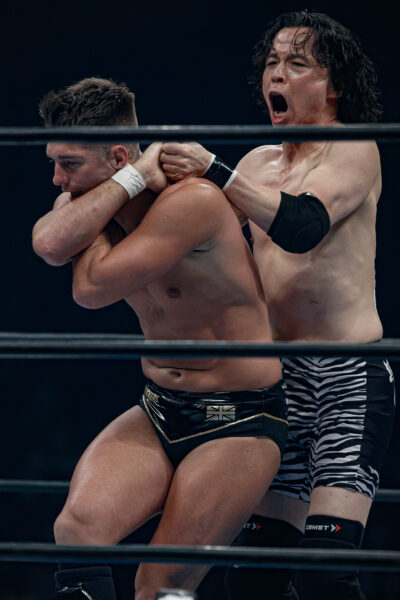
PWI: Switching gears from the younger generation to your own journey: A couple years ago when Suzuki-gun dissolved and you branched out as a solo wrestler, starting from winning the [NJPW] Television championship and being the inaugural person to hold it at Wrestle Kingdom 17 to where you are now, what was in your mind when you evolved and made that clear shift to becoming a frontman and really setting off as a single star? What were you thinking? And did you think that you would be where you are today when you originally set out on that journey?
ZSJ: Japan has always been the, I mean, not even the end goal for me, but the goal. So, with that, I’ve always strived to reach the top, but then I’ve always been happy for the journey. Every experience as a wrestler contributes to who you are. And then, my time in Suzuki-gun, I’m forever in debt to that group because that gave me a real platform and home. The nature of being a touring Japanese wrestler is you’re with your team all the time. Towards the end, I was the only foreign wrestler in Suzuki-gun. I think it really gave me a connection to Japan properly to be amongst a team of Japanese wrestlers, especially during COVID. Everyone was really looking after me, but I felt like Suzuki-gun ended at its perfect time.
I loved that we ended amicably. I think we were one of the only wrestling units that ended in that way, but I think it was the right time for the unit, and it was the right time for me as well. Teaming with Taichi was incredibly fun. I think we brought out the best in each other and we were able to win Tokyo Sports Best Tag Team, which was my first Tokyo Sports award up until now. And I don’t think New Japan had won that for a long time. So [Suzuki-gun] definitely gave me a platform to be in a prominent position in New Japan.
But ultimately, my style, the way that I wrestle, and the way that I’m passionate about, I’m a singles wrestler at heart. With the TV title being announced around that time, it just felt like the right timing to be able to put my stamp on a new championship that didn’t have any preordained image about what the style of this title is. The rules, in theory, do not suit my style so I saw that as a challenge, as well. In title matches or big singles matches, New Japan has a 60-minute time limit, so you’ve got a lot of room for freedom; where 15 minutes is a separate challenge from most of my career where I have the freedom within a larger time limit.
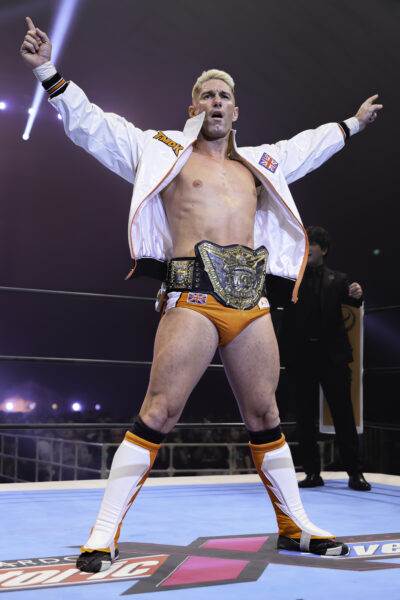
I really owe my entire career to Japanese wrestling. I am reciprocating all of the support and the opportunities I’ve been given … I want to vindicate the company and the country and everyone that’s been behind me the whole time.
PWI: What was that challenge like as a wrestler? Because I think that you have a reputation for these longer matches and during that TV title reign, you had 15 minutes or less. It was a very strong reign with a lot of great title defenses all over the world, but when you’re already so good at something, what is that thought process of changing or condensing your style into 15 minutes?
ZSJ: Well, I am a big fan of post-rock and ambient music. Even some of the techno I listen to, it’s like 10, 12 minute songs. It’s going to sound incredibly pretentious, but I definitely likened it to having an improvisational jazz band trying to make a two-and-a-half-minute radio pop song. I think you always want a new challenge in wrestling. I’ve been wrestling 18 years or so, up until that point, so I think that’s the most exciting thing about wrestling. Even when you’ve been doing it for a long time, there are always new challenges. Ultimately, it’s about how much you want to test yourself and get outside your comfort zone. But I think it reaffirmed to me that my style is adaptable. I believe in the way that I wrestle and will stay true to it regardless. But I think it proved to me that [my style] can work in different formats, as well. Fifteen minutes is a pain in the ass. I get more tired in some of those 8-minute matches. You have people just coming at you nonstop than longer New Japan main events.
PWI: The Speedball [Mike Bailey NJPW TV title match] was crazy.
ZSJ: Well, yeah, he’s a maniac. I don’t think he ever gets tired. It’s impossible. Although, I think I’d rather wrestle him with a 15-minute time limit. Because otherwise, if he’s coming at me like that for 60 minutes, I don’t know which one is worse.
PWI: You’ve made it your mission to put British wrestling on your back, British technical wrestling, specifically, and you’ve had some really high profile matches all over the world, namely with Bryan Danielson and Hechicero. To be able to have these big matches that everybody has their eyes on all over the world, that are rooted in technical wrestling, what has that been like this year? And now that your platform is growing, what are your plans to continue to grow technical wrestling and the British style going forward?
ZSJ: I think the most important thing about pro wrestling is that it can be whatever you want it to be or whatever it can be. So, the restriction is only what the wrestler puts on themselves, or whether it’s another form of art, or sport, or entertainment, or whatever it is. The key is just being sincere in this context. The rest that you want to be, I think people can connect with that, if the sincerity is there. I’m fortunate that I’m in a really prominent position now, but I believe that I’d be wrestling the way that I am without the success that I’ve had. The start of wrestling that I was most passionate about and inspired by was technical wrestling and submission wrestling. That’s what inspired me to become a wrestler in the first place, and that was always going to be the way that I wanted to wrestle. But it takes you a little to figure out.
It’s a sort of continuous progression, and I feel that I’ve got endless room to grow with this style, experiences, everything, too. As you become an old wrestler and everything that adds into your career, I feel like I can continue to evolve it and make it contemporary. But I’m very conscious. I was very lucky to be trained by one of the last traditional British wrestling schools. And as the British wrestling scene becomes much more Americanized, I take pride in being a wrestler with British wrestling roots. So yeah, I’m very conscious to keep as many elements of a traditional British style alive, but every style would always evolve anyway. I’m trying not to have the nostalgia be the driving force. I definitely want each year of my career to be where I can reflect and be like, oh, okay, look, this is how it grew.
Then, directly with the Danielson and Hechicero matches … Bryan is, he’s not one of the best technical wrestlers of all time, he’s the greatest wrestler that’s existed in my lifetime. And Hechicero, I think he’s finally got the attention that he deserves. So yeah, I think the exciting thing about technical wrestling for me is that to be able to do the match in Mexico with Hechicero and have that element of lucha libre and Llave submission wrestling coming through, and then with Bryan in America and in Japan, I hope that it inspires people if they’re passionate about technical wrestling to aim for that style or to show that you can have that style and be successful. But also, that doesn’t mean that’s what I think all of pro wrestling should be. I think pro wrestling is fast, and that’s what makes it beautiful.
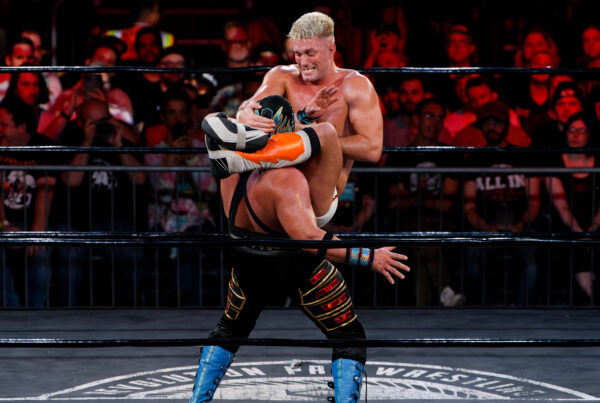
PWI: In the same vein of British wrestling, you, right after winning the G1 Climax, got to perform in Wembley Stadium, come out to Mass Lines and have a staredown with Nigel McGuinness, who made his return after a long time away from the ring. What was that week like? Not to mention, you wrestled Hechicero the night before in Copper Box Arena.
ZSJ: That was a mad week. Every young Brit dreams of performing at Wembley. I think probably most young kids are dreaming of playing football there or maybe playing a gig. To get to do it for pro wrestling definitely felt much more rewarding. I had no idea that Nigel was going to be involved in it either. I was blown away by the response. Obviously, I spent most of my career in Japan. I don’t wrestle full-time for AEW, so I wouldn’t have expected the reaction that I got. And then to have Mass Lines playing. Chris Thomas, the front man of Mass Lines, is a really old friend of mine. We both grew up on the Isle of Sheppey together and were both in Canterbury after. So yeah, to be able to have a close friend’s song play me out in Wembley Stadium against a British wrestler like Nigel that I’d come to terms with never getting to wrestle, and then to actually have it so well received seems like I’ve just made it up. The fact that’s actually a real thing that happened is a highlight of an insane year.
And [Nigel] owes me … he still owes me a singles match, as well, because Big Nige looks very genki, that’s healthy in Japanese. He is in the shape of his career, although I do wish he had his old hair and the iron and the spikes. Is he still claiming that he singlehandedly reunited Oasis as well?
PWI: Yes.
ZSJ: He can have that. Yeah. If Nigel was getting back in the ring, I’ve been able to wrestle some really incredible wrestlers, and I’d have come to terms with never getting to wrestle with Nigel in a one-on-one match, but I think that has to happen at some point.
PWI: I mean, [AEW X NJPW] Forbidden Door is in London in 2025.
ZSJ: Maybe Nigel, I’ll do my hair like yours. We’ll do it together. I’ve got blonde hair now, too. I think we’ll leave the iron at home, though.
PWI: Wrestle Kingdom, this is the third big checkmark that you had for this year, walking into Wrestle Kingdom as IWGP World heavyweight champion. You’re up against Shota Umino, who is a controversial pick to say the least. Your career this year, it seems to be the year where you reap all the benefits of all your hard work. There’s been so much conversation about Shota (Umino), the entire Reiwa era, the Musketeers, the younger generation, and who’s deserving of what. What are your thoughts about him being in such a big prominent spot at the Tokyo Dome in 2025, such a time of change for New Japan?
ZSJ: I think one thing that’s perhaps a bit misguided with the reactions to Shota is that the moments that he’s been booed were both following my title victory and my defense against Shingo. Previously in the night on those events, he was cheered and very popular. I’m touring around the entire country continuously. The reactions that he gets are very positive. He’s definitely one of the most popular young wrestlers in the whole company. I think the Japanese fans are very pragmatic and just perceive him to have not perhaps had the achievements this year or since returning from excursion to warrant challenging for me, and then, specifically, at the Tokyo Dome. But I mean, objectively, this is the strongest year of my entire career. I believe that the main event of Ittenyon January 4 always should be only against a full-time New Japan wrestler.
This is the most important platform for the company to really set up not just the year, but the future, Especially since Wrestle Dynasty is the following day, then I think that’s the day for collaboration. If it’s not Shota, objectively, who this year has a rightful stake to challenge? He’s the only person that continuously had my number over these last few years. I mean, he’s beat me in three tournaments now at New Japan Cup 2023, during the G1 and then during World Tag League. My objective is to lead New Japan into the future. I’ve obviously got the benefit of having a 20-year career. I think that’s why my achievements this year have been so warmly received, obviously globally, but really domestically in Japan. It’s been a long journey so you can’t really cheat experience in that way, but I think his eagerness to reach the top of New Japan is the right merit.
But I think that’s also why [his eagerness] is perhaps perceived to be, probably desperate is the wrong word, but rather than just letting things naturally come at the right time. And then the downfall would be proclaiming yourself the “Ace” before you are. That’s a term that’s given to you. It’s not one that you can bestow upon yourself, even if the intention is sincere. But I think it’s a great opportunity for New Japan. This is the first Tokyo Dome main event where both people involved in the match are first-time main-eventers so I think the symbolism of it is still really important. And then it’s my role now as the champion and as the most experienced wrestler to bring out the best version of Shota. This is my first Tokyo Dome main event, so even with all the success that I’ve had this year, I still have to make myself a Tokyo Dome-level main event for the first time. But I also have to make my opponent that, as well, and I’m very confident that I can do it.
PWI: Typically as a foreigner, you’re one of the only foreigners in New Japan, but with the Tokyo Dome shows, there are going to be a lot of foreigners coming in from CMLL, AEW, Ring of Honor. You’ll also have women involved from the Stardom side. There’s so many people making either debuts or returns to the Tokyo Dome like Kenny Omega, Mercedes Moné, in addition to the International Women’s Cup. So many people, even Oiwa and Fujita are people who’ll come into the Dome for the first time or first time in a long time. Is there anything that you’re excited to see over those two days as a fan of professional wrestling that you’re looking forward to?
ZSJ: The laziest thing will just be me saying about my own boys, but the fact that Fujita and Robbie (Eagles) are challenging at the Dome, challenging for the Junior tag titles, I mean, Fujita and Oiwa are both three years into their career, but I think it’s almost forgotten at this point or rightfully neglected. The level and the capability they have is just phenomenal. Also, I’m really happy that Robbie Eagles is in a prominent position at the Tokyo Dome, and I think they’re going to lead in the junior heavyweight division for the foreseeable future.
Big Roy being in a Tokyo Dome title match three months after returning to New Japan is really incredible. I’m most excited. I think Wrestle Dynasty, especially, is just incredibly fresh. I’m excited for the New Japan fans. Obviously, there’s going to be a lot of international fans coming, but I’m excited for the Japanese fans just to be able to get to watch a really diverse and varied Tokyo Dome event. Positions on the Tokyo Dome card when there’s just one event in a year are very coveted. I think there’s so many people that might not have had opportunities before that get to be on this platform. Every wrestler understands the importance of something of the level of a Tokyo Dome event. So, I think the quality of the show is not in doubt at all. If there’s any doubt about the cards, I think once the events have happened, people are going to be really blown away.
PWI: Obviously, you are rare as not just one of the only foreigners to ever main-event the Tokyo Dome but also lead the company. What does it mean to you to be a foreigner in Japan? A lot of people talk about going to Japan to get better, but it’s typically to train then go somewhere else. But this has always been your end game. What’s the responsibility that you feel towards leading the company and knowing that you’re in rare air in doing so?
ZSJ: I think everyone has different objectives. I think there’s nothing wrong with a wrestler who’s striving for success in America to want to come to Japan for experience or to wrestle here for a short period of time. But this is the end goal for me and that’s why I wanted to train in a Japanese dojo. I’d been wrestling for nine years before I got invited to the Pro Wrestling NOAH Dojo, and I jumped. I got on the first possible plane that I could because I knew that to cement myself into the landscape here, it takes time, and it takes effort and transparency to show that you are respectful and passionate about the industry here. I think the reception that I’ve had this year, especially before the G1 and before the title match, obviously Japanese fans are very encouraging, but it’d be easy for them to sort of be like” Zack, just do your best.” But before everything, it was like, “No, you will win,” or, “We think you’re going to win the G1.” I could just feel the perception and view of me change. And I think that’s just the culmination of 13 years here and the fact that I can’t hide my nerdiness about Japanese wrestling.
I think I really owe my entire career to Japanese wrestling. I am reciprocating all of the support and the opportunities I’ve been given and then to be so warmly received this year with all the achievements I’ve had, I want to vindicate the company and the country and everyone that’s been behind me the whole time. I see my responsibility to not only lead New Japan, but also to bring out the best in all of the young wrestlers. My goal by defeating Shota, for example, at the Tokyo Dome, that I’m going to give him all of the tools that he needs to become the wrestler that can himself lead New Japan into the future. Right now, I’m focusing on my own success still, whilst obviously helping the young wrestlers as much as possible. But in the near future, it’ll be my responsibility to solely focus on assisting the young wrestlers.
PWI: This year, there’s not just one Tokyo Dome show, there’s two, and you have another opponent on January 5. Ricochet is making his return to New Japan Pro-Wrestling in the Tokyo Dome. Obviously, he’s now part of AEW, he’s made a significant career shift over the past couple months, trying to return to his old form and bring something new to the table. What are your thoughts about Ricochet, coming in, attacking you, aiming straight for the top, and Wrestle Dynasty as a whole, adding on this second show and having on the product than typically?
ZSJ: Well, I think that’s the suavest way I’ve ever been attacked in my entire career. I can’t believe … I mean, I’m in a suit right now. I can barely … well, I have on slip-on loafers, so they don’t have any shoe laces because I can barely bend down to tie laces that aren’t there. The fact that he was able to springboard and fly at me in a suit and dress shoes is remarkable. And obviously, the fans in Osaka were very excited and happy to see Ricochet back. He’s got an amazing history in Japan. He spent a lot of time here and has a great perspective of two different companies between Dragongate and New Japan. Ricochet and I have a big history. We’ve wrestled all over the world. We’ve had singles matches in the U.K., Germany, all across America. The first trip that I had to Australia, we wrestled twice.
Japan is one of the last places we need to tick off. At the Tokyo Dome, possibly for the IWGP World heavyweight title, is the biggest platform we can do it. We are generational rivals in a way. We’re a similar age, have similar career lengths. Like I said, I’m going to main-event in the Tokyo Dome for the first time, and then I plan on doing that back-to-back nights. But likewise, with Shota being a first-time main-eventer as well, Ricochet’s in that same position. So I know that he will understand the gravitas of it as well. Especially having left his previous employers and being in AEW now, I expect the best version of Ricochet, and I’m excited to see how Ricochet will approach wrestling for the [IWGP World] heavyweight title. He was a junior heavyweight in New Japan for a long time, but he’s in incredible shape. He was already before, he was one of the strongest wrestlers I’ve ever been in the ring with. It was ridiculous. So, I only know he is going to be in better condition and shape now, but with heightened motivation.
Both matches have the opportunity, but as fresh Tokyo Dome main events where there’s not an expectation of, “Okay, this is how these previous races that have had multiple main events, this is how they approach it.” I think that’s one of the most exciting things about it. On paper, perhaps they’re somewhat unusual Tokyo Dome main events, but that’s how you progress a company and how you usher in a new era where it’s a very interesting time for New Japan. I think we have more young potential main-eventers or top young stars than ever before in New Japan’s history, whether that’s foreign or Japanese. The Dojo’s done an incredible job recently, but I see my responsibility is to be carrying New Japan for the foreseeable future until those young wrestlers are ready. Obviously, I’m biased, I think it’ll be Oiwa to usurp me. But I hope … yeah, just let me have the belt for a little bit, Roy, let me have a little bit.
NJPW Wrestle Kingdom 19 takes place LIVE on Saturday, January 4 at 3:00 am EST/12:00 am PST on NJPW World & Triller. The NJPW x AEW x ROH x CMLL x STARDOM co-promoted Wrestle Dynasty will air LIVE on Saturday, January 4, 2025 (Sunday, January 5 in Japan) at 11:00pm EST/8:00pm PST on NJPW World & Triller.

